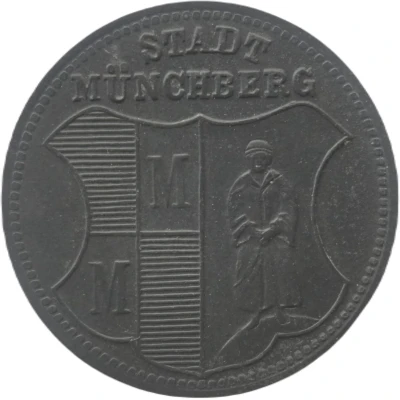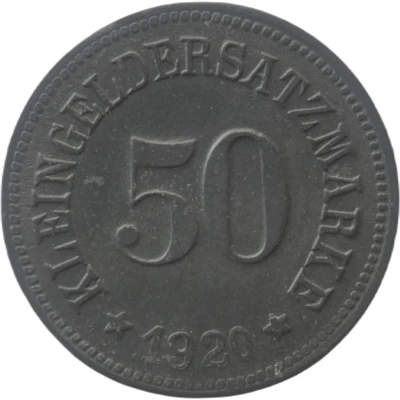


© Willem63 (CC BY-NC-SA)
50 Pfennigs - Münchberg
1920 year| Zinc | 2.7 g | 22.5 mm |
| Issuer | City of Münchberg (Federal state of Bavaria) |
|---|---|
| Period | Weimar Republic (1918-1933) |
| Type | Standard circulation coin |
| Year | 1920 |
| Value | 50 Pfennigs (50 Pfennige) (0.50) |
| Currency | Mark (1914-1924) |
| Composition | Zinc |
| Weight | 2.7 g |
| Diameter | 22.5 mm |
| Thickness | 1.0 mm |
| Shape | Round |
| Technique | Milled |
| Orientation | Medal alignment ↑↑ |
| Demonetized | Yes |
| Updated | 2024-10-04 |
| Numista | N#307037 |
|---|---|
| Rarity index | 91% |
Reverse
Beaded rim, legend and date surrounding denomination centered
Script: Latin
Lettering:
KLEINGELDERSATZMARKE
50
★ 1920 ★
Edge
Plain
Interesting fact
The 50 Pfennigs - Münchberg 1920 coin was minted during a time of economic turmoil in Germany, known as the "Inflationary Period" (1914-1923). During this time, the value of the German mark (the national currency) dropped significantly, leading to a period of hyperinflation. As a result, many Germans turned to alternative forms of currency, such as local coins like the 50 Pfennigs - Münchberg 1920, which were issued by cities and towns across the country. These local coins were often made of cheaper materials, like zinc, and had a lower face value than the national currency. Despite their lower value, these coins played an important role in everyday transactions and were widely used by the local population.